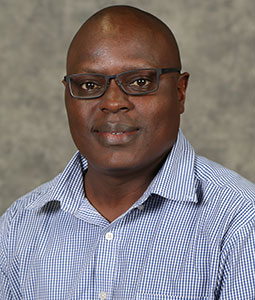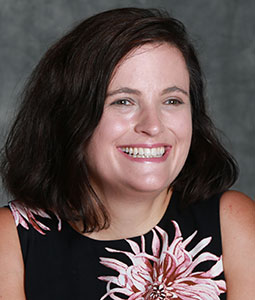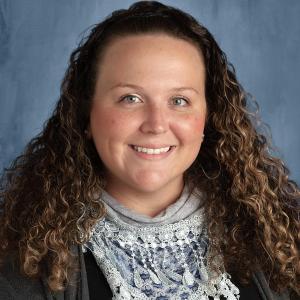Dick Kawooya, Ph.D.
Principal Investigator

Dick Kawooya teaches and researches in the area of information policy, law and ethics with a primary focus on the impact of copyright and access to knowledge. Kawooya has been working for more than twenty years on research and policy advocacy regarding issues of copyright and access at the World Intellectual Property Organisation and other international fora. Most recently, he has focused on the implementation of the Marrakesh Treaty to Facilitate Access to Published Works for Persons who are Blind, Visually Impaired or Otherwise Print Disabled (Marrakesh Treaty), which is partly the focus of the study. He has led or co-led a number of large scale multi-country research and policy engagement projects, notably, the African Copyright and Access to knowledge Project, 2007–2010 (Lead Researcher); Open AIR Project on Knowledge and Innovation in Africa, 2010–2014 (Researcher); Right to Research in International Copyright Law, 2021–present (Researcher and Africa Regional Coordinator). Kawooya is the Principal Investigator responsible for the overall execution of the project. His most recent publications relevant to the project are:
- Kawooya, D., Keninger, K., Owen, V., & Tabb, W. (2016). The treaty of Marrakesh: From good law to good implementation. World Libraries. 22(1).
- Kawooya, D. (2023). Marrakesh Treaty and access for blind and visually impaired information professionals. Copeland, C. A. (Ed.). (2023). Disabilities and the library: Fostering equity for patrons and staff with differing abilities (pp.239-255). Libraries Unlimited.
Clayton Copeland, Ph.D.
Co-PI

Clayton Copeland is a faculty member and director of the Accessibility Leadership Lab at the School of Information Science at the University of South Carolina. She specializes in information access and accessibility for populations with disabilities. She brings over sixteen years of experience with research and teaching in equity of access and disability, and works as a professional accessibility consultant, including work with the National Library for the Blind and Print Disabled.
Copeland serves as co-PI of the project and will work actively during all phases of the project. She will be responsible for the ongoing literature review, assist with the design of the research instruments, data collection and analysis, as well as distribution of findings, particularly through presentations and publications. Copeland is the Editor of Disabilities and the library: Fostering equity for patrons and staff with differing abilities.
Copeland, C. A. (Ed.). (2023). Disabilities and the library: Fostering equity for patrons and staff with differing abilities. Libraries Unlimited.
Eric P. Robinson, Ph.D.
Co-PI

Eric Robinson is an attorney and scholar focused on legal issues involving the media, internet and social media. As consultant on the IMLS project, Robinson will work with Jonathan Band on the law regarding accessibility and copyright. He is an Associate Professor in the School of Journalism and Mass Communications at the University of South Carolina and an Academic Affiliate of the University of South Carolina School of Law. He was a member of the university’s Intellectual Property Committee from June 2018 to August 2021; as elected chair of the committee during the 2020-21 academic year, he drafted and oversaw adoption of the University’s new copyright policy in May 2021. Robinson is also “Of Counsel” to Fenno Law in Charleston/Mt. Pleasant, South Carolina. He previously taught media law and ethics at Louisiana State University, the City University of New York Graduate School of Journalism, Baruch College (CUNY), and the University of Nevada, Reno. He was also co-director of the Press Law and Democracy Project at LSU and deputy director of the National Center for Courts and Media at the University of Nevada, Reno. He was also an affiliate scholar with the Digital Media Law Project at Harvard Law School’s Berkman Center for Internet and Society; a staff attorney at the Media Law Resource Center; and a legal fellow at the Reporters Committee for Freedom of the Press. Robinson is co-author of Cyber Law and Ethics: Regulation of the Connected World (2021) and a contributor to the widely used textbook Media Law and Ethics (2021). He was the sole author of Reckless Disregard: St. Amant v. Thompson and the Transformation of Libel Law (2018), as well as lead contributor and editorial reviewer for Internet Law: The Complete Guide (2016-2019).
Jonathan Band, J.D.
Consultant

Jonathan Band will review all project documents to ensure that they are consistent with the existing legal provisions for BVIPD services at IHEs. Band is a copyright attorney who has represented libraries in connection to the Marrakesh Treaty and the Marrakesh Treaty Implementation Act. He has developed materials concerning the Marrakesh Treaty and its implementation for organizations such as the United Nations Development Programme, Electronic Information for Libraries, and the U.S. Library Copyright Alliance (consisting of ALA, ARL, and ACRL). Band runs a private consulting firm based in Washington, D.C. Additionally, he is an adjunct professor with Georgetown University Law Center, a position which affords him experience with the university system and accessibility practices for BVIPD students.

Courtney Swartzendruber
Graduate Assistant
Courtney Swartzendruber is in the process of completing a MLIS, in conjunction with a certificate in Diversity, Equity, Inclusion, and Access, within the School of Information Science at the University of South Carolina. As a former English educator, she highly values the freedom to read and equity of access to information. She believes, through her experience within the iSchool in addition to assisting in this project, that she will gain the necessary skills to advocate for those who encounter barriers within the academic and library community.